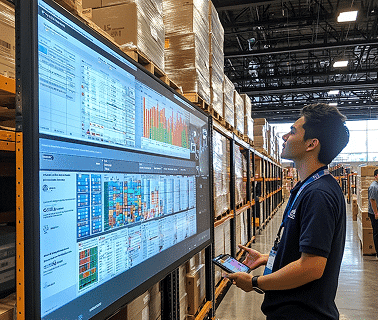Listen to this blog
Blockchain technology in supply chain management is a distributed ledger technology used to record and store transactions. It is an innovative solution for many industries, including supply chain management.
Blockchain technology is making waves in the supply chain management industry. This digital ledger system has many uses, but one of the most interesting and potentially disruptive is its ability to track when a product was shipped, where it went, and what’s happening with it now.
It is no secret that supply chains are complicated. They involve multiple parties working together to get products from A to B. But with blockchain, those parties can work together more seamlessly and effectively.
Blockchain technology can help businesses manage their supply chains by providing an immutable record of all transactions that occur along the way and it allows them to do this without having to trust each other or depend on a third party for verification. This makes it possible for businesses to maintain complete transparency in their operations while remaining flexible enough to adapt if necessary.
Blockchain also offers cost reduction, improved visibility into supply chain activities, and reduced fraud risk through increased transparency into transactions between partners (and suppliers). It also delivers increased speed services when it comes to the time needed for payment processing or delivery confirmation by eliminating manual steps involved with traditional systems.
Blockchain can also be used as a distributed database that can be used to store information and cryptocurrencies. Blockchain technology in supply chain management is a digital ledger that records all transactions in a network. It works as a public ledger where everyone can see the transactions, but no one can alter or delete them. Unlike traditional databases, the blockchain has no central copy or administrator, and it’s not kept on any single computer but instead shared across many computers in the network.
ALSO READ: Supply Chain Management and Industry 4.0
What is blockchain technology?
Blockchain technology is the backbone of all bitcoin transactions. It is a decentralized public ledger that lets users track digital currency transactions. This technology has many applications beyond bitcoin and its use in cryptocurrencies. Here are some examples of how this technology can be used in Supply Chain Management:
Supply chain management (SCM) often involves multiple parties, including buyers, suppliers, manufacturers, distributors, retailers and others. The supply chain process begins when an organization receives an order from a customer and ends when it ships the product to the customer or delivers it to another party along the supply chain. Therefore, companies need to maintain visibility throughout the entire process to avoid delays or additional costs due to bottlenecks or changes in demand.
Blockchain technology can help organizations achieve this goal by providing real-time visibility into each step along the supply chain and allowing them to store records securely on an immutable ledger that cannot be tampered with once data has been entered into it (e.g., using consensus algorithms).
The use of blockchain technology in supply chain management for tracking shipments across borders has been limited because of issues related to regulations around privacy laws; however, new rules have recently been put into place that allow the tracking of objects till they reach their owner.
Blockchain technology has many applications in supply chain management (SCM). In fact, SCM professionals have been exploring ways to use it since before it was even named “blockchain.” Some of the ways SCM professionals are currently using this technology include:
- Managing physical assets through smart contracts
- Ensuring product integrity through tracking systems
- Verifying shipments and packages through messaging systems
6 ways how can blockchain be used to support sustainable business practices
| Advantage | Description |
|---|---|
| Making the process more efficient | Blockchain technology is helping companies manage processes more efficiently by enabling them to maintain a secure and transparent record of transactions. |
| Improves transparency | Blockchain technology is all about transparency and accountability. By creating an immutable record of transactions that cannot be altered or deleted, blockchain ensures that every transaction is permanently recorded for posterity |
| Cost-cutting | Blockchain can help you save money on all kinds of things, from processing payments to managing inventory and logistics. |
| Enhance product traceability | Blockchain technology has been used to track and trace products. This is done by monitoring the movement of goods from one location to another. |
| Streamline product recall | Regarding product recalls, blockchain technology can help streamline the process by providing a secure database that can be accessed by all parties involved in the recall. |
| Reduce fake products/counterfeiting | Blockchain technology helps reduce counterfeiting by ensuring that any product you buy has an unchangeable record of every step from production through shipping and sale. |
Blockchain technology in supply chain management is all the rage right now, and for a good reason. The technology has the potential to revolutionize everything from finance to manufacturing, and it is no surprise that it’s being adopted by businesses of all sizes and types.
If you are a business owner who wants to make your company more sustainable, blockchain might be an ideal fit for you. In this article, we will explore six ways blockchain technology can help your company take steps toward sustainability.
- Making the process more efficient
Blockchain technology is helping companies manage processes more efficiently by enabling them to maintain a secure and transparent record of transactions.
Blockchain is a digital ledger system that sees to it that each transaction is verified by a group of participants in the blockchain, who must agree that the transaction took place, and then it is added to the chain. Furthermore, once a transaction has been recorded, it cannot be altered without altering all subsequent blocks, making blockchain virtually hack-proof.
Blockchain technology can be used for any digital transaction, from currency exchanges to property transfers. It can also be used to track supply chains, verify identities and credentials, or even store medical records or other sensitive information securely and privately.
- Cost-cutting
In our world of global trade and services, there is much to be said for efficiency. However, cutting costs is one of the most effective ways to get things done efficiently. This is where blockchain technology comes in.
Blockchain has been used for almost a decade, but we are just beginning to scratch the surface of its potential. One of the most exciting blockchain applications is cost-cutting in the service industry. The reason why blockchain can help you save money on all kinds of things, from processing payments to managing inventory and logistics.
Let’s say you own a business that sells widgets online. To sell the widgets, you must process payments through your bank or credit card processor, which means paying fees for each transaction made through your platform. However, these fees can be eliminated with blockchain technology because smart contracts handle transactions (instead of middlemen). You will also see cost savings while shipping products since these transactions are automated, too. You don’t need a warehouse or delivery trucks anymore! And because everything is stored as data on an immutable ledger (i.e., blockchain), it’s easier for companies like yours to keep track of what is happening with your supply chain at any given time.
As such, by using blockchain technology, you can reduce costs significantly by eliminating third parties involved in facilitating transactions between two parties. This can also help improve efficiency by reducing time spent on reconciliation at every stage of your supply chain management process and improving transparency and traceability for all stakeholders involved in the transaction process.
- Enhance product traceability
In supply chain management, blockchain technology has been used to track and trace products. This is done by monitoring the movement of goods from one location to another. This helps enhance product traceability, a key component of quality management systems.
The process of tracking goods using blockchain technology involves the following steps:
- Put an RFID tag on the product. The RFID tag contains information about where the product was manufactured and when.
- Send this information through a blockchain network, which can be accessed by anyone who wants to access it via their mobile device or computer.
- Once this data has been sent through the network, there will be no need for any human intervention for it to be accessed. It is because all that needs to be done is for someone with access rights to request access to this data via their device or computer. Then they will automatically receive access to all kinds of information about where this particular product came from and when it was made, among other things.
- Streamline product recall
Regarding product recalls, blockchain technology can help streamline the process by providing a secure database that can be accessed by all parties involved in the recall. This means that companies can enter data on their products and keep track of how many units have been recalled.
In recent years, the number of product recalls has increased significantly. This is due to a combination of factors, including changes in supply management technology and regulations. While it is difficult to determine how many products have been recalled each year, there are an estimated 1,500 recalls per year.
While product recalls are necessary for the safety of consumers, they can be difficult and expensive for companies to manage. In fact, the average cost of a recall is $10 million.
In addition to being able to track products more efficiently, blockchain technology also helps companies avoid issues related to data management and privacy concerns because it does not require them to share sensitive information with third parties who may not be trustworthy or competent enough to handle such information appropriately.
In simple words, there are three main ways blockchain helps streamline product recall:
- Blockchain makes it easier for companies to access their own data without having to rely on third parties such as manufacturers or distributors
- Blockchain allows companies to share this data with regulators without worrying about security breaches.
- Blockchain lets consumers securely access their own records if they ever experience an issue with their products or services.
- Reduce fake products/counterfeiting
Counterfeiting costs businesses billions of dollars each year, and it threatens the livelihoods of workers who make those products by devaluing their work and deceiving consumers.
Blockchain technology helps reduce counterfeiting by ensuring that any product you buy has an unchangeable record of every step, from production through shipping and sale. In fact, some companies have started using blockchain as part of their supply chain management system to track where their products come from and whether they’re authentic.
Blockchain can help reduce the number of fake products on the market by allowing people to check whether their purchase is authentic. If a company uses blockchain technology, then they can provide information about their product’s origin and what materials they use in production. This information can be accessed by anyone who wants to know it when they buy something from that company.
- Improves transparency
Blockchain technology is all about transparency and accountability. By creating an immutable record of transactions that cannot be altered or deleted, blockchain ensures that every transaction is permanently recorded for posterity, and that all parties involved in an exchange can verify each other’s identity and interests. This can help eliminate fraud and corruption in many fields, including finance and government.
YOU MAY ALSO LIKE: Job opportunities for an supply chain management graduate
Learn supply chain management with PGCP in Logistics and SCM from Online Manipal
Learning blockchain and supply chain management with PGCP in Logistics and Supply Chain Management from an Online Manipal course is a great way to gain the knowledge you need to advance your career.
Supply Chain Management (SCM) is integral to many businesses and can be challenging to learn. Many companies have large departments dedicated to SCM and the logistics management of their supply chain, so these skills are in high demand.
If you are looking for a way to expand your knowledge base and improve your skill sets, consider taking an online SCM course. This will allow you to learn at your own pace while still meeting deadlines and other requirements set by employers.
The benefits of learning blockchain and supply chain management with PGCP in Logistics and SCM from Online Manipal include:
- Flexibility: You’ll be able to study when it is convenient for you, whether during work hours or after hours.
- Convenience: An online course means no travel time or having to find childcare for the kids during class time! You’ll be able to complete assignments on your own schedule without needing help from anyone else (except maybe Google).
- Lower cost than most on-campus courses today thanks to lower overhead costs for students and instructors who teach professionally in an easy understanding way.
Key takeaways:
- Blockchain is a distributed database that is used to create a permanent, tamper-resistant record of transactions.
- The technology can be used in many industries, including supply chain management.
- Blockchain was originally developed as the accounting method behind Bitcoin and other cryptocurrencies, but its potential applications are much more extensive than just digital currencies.
- Blockchain technology can be used to track the movement of goods through supply chains and to verify that products are authentic.
- This allows companies to reduce costs associated with counterfeiting, fraud and theft, while also increasing trust among consumers who might be concerned about where their products come from or who made them.
Prepare for your next career milestone with us







